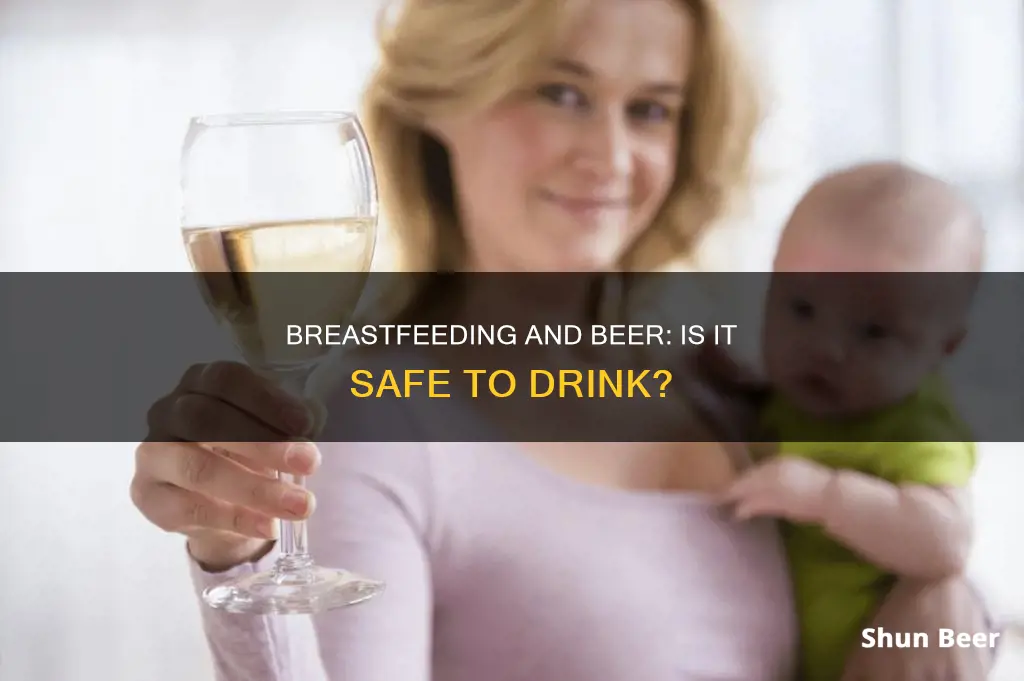
It is not recommended to consume alcohol while breastfeeding, as it can be harmful to the infant. However, having an occasional drink in low or moderate amounts is unlikely to harm your baby. It is advised to wait for at least two to three hours after drinking one alcoholic beverage before breastfeeding. The alcohol concentration in breast milk is similar to that in the blood, and it can negatively affect the infant's development, growth, and sleeping patterns. It is crucial to plan ahead and ensure safe sleeping arrangements if consuming alcohol while breastfeeding.
| Characteristics | Values |
|---|---|
| Is it safe to drink 2 beers and breastfeed? | It is not recommended to consume more than one alcoholic drink per day while breastfeeding. |
| How long should I wait after drinking 2 beers to breastfeed? | It is recommended to wait for at least 4-5 hours after consuming 2 drinks before breastfeeding. |
| How does drinking alcohol affect breast milk? | Alcohol passes from the bloodstream into breast milk and can affect the hormones that control milk production and ejection. |
| What are the risks of drinking alcohol while breastfeeding? | Drinking alcohol while breastfeeding can have negative effects on the baby's sleep, weight gain, and development. It can also impair the judgement and reaction time of the breastfeeding parent. |
| Can drinking alcohol increase breast milk supply? | There is no evidence that drinking alcohol increases breast milk supply. In fact, alcohol can hinder the milk ejection reflex and reduce milk production. |
What You'll Learn

How long after drinking alcohol is it safe to breastfeed?
It is important to note that not drinking alcohol is the safest option while breastfeeding. However, if you do choose to consume alcohol, it is recommended to wait at least two to three hours after drinking one standard drink before breastfeeding. This allows time for the alcohol to leave your breast milk.
The time you need to wait can vary depending on several factors, including how many drinks you have, how quickly your body breaks down alcohol, and whether you consumed alcohol with food. For example, if you have two drinks, it is recommended to wait four to five hours before breastfeeding.
It is also important to understand what counts as one standard drink. According to the Dietary Guidelines for Americans, one standard drink is:
- 12 oz. of 5% ABV beer (about one can)
- 8 oz. of 7% ABV malt liquor (around the size of a standard drinking glass)
- 5 oz. of 12% ABV wine (one glass)
- 1.5 oz. of 40% ABV (80-proof) liquor (one shot)
Additionally, it is recommended to avoid drinking alcohol and breastfeeding at the same time, as alcohol can interfere with levels of prolactin, a hormone that helps produce milk. It may also cause your breast milk to taste differently, which your baby might not enjoy.
If you have any questions or concerns about drinking alcohol while breastfeeding, it is always best to consult with a healthcare professional.
Beer Left Out: Is It Still Safe to Drink?
You may want to see also

What are the risks of drinking alcohol while breastfeeding?
While drinking alcohol in moderation while breastfeeding is unlikely to be harmful to your infant, abstaining from alcohol is the safest option. The risks associated with drinking alcohol while breastfeeding include:
- Impaired judgment and compromised safety of the child: Alcohol impairs your judgment and reflexes, reducing your ability to care for your child. Drinking alcohol and breastfeeding simultaneously is not recommended.
- Negative impact on infant development: Research has shown that alcohol consumption can negatively impact an infant's growth, motor function, and sleep patterns. One study found that infants slept 25% less than usual after consuming alcohol in breast milk.
- Decreased milk intake by the baby: Nursing babies who are regularly exposed to alcohol through breast milk may experience a reduction in their milk intake of up to 23%.
- Potential developmental problems: Exposure to alcohol in breast milk may lead to future developmental issues, such as trouble with reasoning and impaired cognitive development.
- Impact on milk production and ejection: Alcohol can interfere with the hormones that influence the milk ejection reflex, resulting in a delay or reduction in milk ejection. Regular alcohol consumption can lead to a decrease in overall milk supply.
- Negative impact on infant weight gain: Daily alcohol consumption has been linked to slower weight gain in infants.
- Increased agitation in infants: Exposure to alcohol in breast milk can cause infants to become more agitated and disrupt their sleep patterns.
- Risk of sudden infant death syndrome (SIDS): Drinking alcohol and sharing a bed or sleeping surface with your baby increases the risk of SIDS.
- Long-term effects: The long-term effects of alcohol consumption while breastfeeding are still unknown, and more research is needed to understand the potential consequences.
It is important to note that the amount of alcohol consumed, the timing of alcohol consumption, and individual factors such as body weight and metabolism will influence the level of risk associated with drinking alcohol while breastfeeding. If you have any concerns or questions, it is always best to consult with a healthcare professional.
Beer and Canker Sores: Is It Safe to Drink?
You may want to see also

Does alcohol increase or decrease milk supply?
While drinking alcohol in moderation while breastfeeding is not illegal and has been done throughout history, it is important to understand how alcohol affects milk supply and the infant's health.
Alcohol interferes with the hormones prolactin and oxytocin, which are crucial for milk production and the milk ejection reflex. Even a small amount, such as a single beer or glass of wine, can disrupt the balance of these hormones in breastfeeding women. While the immediate effects on milk production last only as long as the alcohol is in the system, chronic alcohol use can potentially lower overall milk supply.
Studies have shown that babies tend to get about 20% less breast milk if they nurse in the first four hours after the mother consumes alcohol. This is because alcohol slows down the milk release, and babies don't metabolise alcohol as well as adults, so they take in less milk. However, compensatory increases in milk intake have been observed 8-16 hours after exposure when mothers refrain from drinking.
The effects of alcohol on milk supply and the infant's health are directly related to the amount the mother ingests. Therefore, occasional light drinking is unlikely to cause a significant decrease in milk supply or harm to the baby. However, regular and heavy drinking can lead to a lower milk supply and adverse effects on the baby's growth and development.
If you are concerned about the effects of alcohol on your milk supply, it is best to consult a healthcare professional for personalised advice.
Drinking Beer in Public: Thailand's Unspoken Rules
You may want to see also

What are the effects of drinking alcohol on breastfed babies?
While breastfeeding, it's best not to consume any alcohol, as it can be passed on to the baby through breast milk. However, having an occasional drink is considered safe, and drinking up to one standard drink per day is not known to harm the infant. Nevertheless, it's crucial to practise caution and plan ahead.
The level of alcohol in breast milk corresponds with the alcohol level in the bloodstream. Typically, it takes around two hours for an adult to metabolise one drink, and the alcohol content in breast milk is highest 30 to 60 minutes after consuming alcohol. Therefore, it's recommended to wait for at least two to three hours after drinking one alcoholic beverage before breastfeeding. This duration increases with the number of drinks consumed, with three drinks requiring a wait time of six to eight hours.
Consuming alcohol while breastfeeding can have several effects on the baby:
- Sleep disturbances: Exposure to alcohol through breast milk can disrupt the baby's sleep patterns, causing increased REM sleep and reduced total sleep.
- Decreased milk intake: Alcohol can interfere with the hormone that controls the 'let-down' or milk ejection reflex, resulting in a decrease in the amount of milk the baby consumes.
- Weight gain issues: Alcohol can negatively impact the baby's weight gain, potentially leading to abnormal weight gain or difficulty in gaining weight.
- Developmental delays: Regular exposure to alcohol in breast milk has been linked to developmental delays, including impaired motor development and potential cognitive impairments.
- Other health concerns: Alcohol consumption by the breastfeeding parent may also lead to impaired immune function in the baby and potential problems with abstract reasoning at school age.
It's important to note that the effects of alcohol on the baby depend on various factors, including the amount of alcohol consumed, the timing of breastfeeding after drinking, and individual differences in alcohol metabolism. Additionally, newborns and younger infants have a slower metabolism for alcohol compared to older babies and adults.
Drinking Beer and Pancreatitis: What's the Connection?
You may want to see also

What are the long-term effects of drinking alcohol while breastfeeding?
While drinking alcohol in moderation while breastfeeding is not against the law and has been done throughout history, the long-term effects of alcohol consumption on breastfed babies are still unknown.
The effects of alcohol on a breastfed baby are directly related to the amount the mother ingests. It is recommended that mothers wait at least two hours after drinking one standard drink before breastfeeding. The more alcohol is consumed, the longer it takes to clear the mother's body. For example, a 140-pound woman would need around two to three hours to eliminate the alcohol in one serving of beer or wine from her body, but if she had four drinks, it would take nine to ten hours for her breast milk to contain no alcohol.
Some sources suggest that drinking alcohol while breastfeeding can negatively affect the baby's sleep patterns and weight gain. Alcohol can also interfere with the milk ejection reflex, causing the baby to consume less milk. However, other sources suggest that occasional moderate drinking is not harmful to breastfed babies.
It is important to note that newborns have immature livers and are more affected by alcohol. Up until around three months of age, infants metabolize alcohol at about half the rate of adults. Therefore, it is recommended to avoid drinking alcohol until the baby is at least eight weeks old.
Beer and Lamotrigine: What You Need to Know
You may want to see also
Frequently asked questions
It is not recommended to have more than one alcoholic drink per day when breastfeeding. Two drinks can be safe, but it is best to wait four to five hours after drinking before breastfeeding.
It is recommended to wait at least two hours after drinking one alcoholic beverage before breastfeeding. If you have had two drinks, it is best to wait four to five hours.
Alcohol can affect the balance of hormones that control breast milk production and can reduce supply. It can also change the way breast milk tastes and smells, which may cause the baby to refuse to feed.
Occasional light drinking while breastfeeding has not been shown to have adverse effects on babies. However, it is best to avoid drinking alcohol until the baby is at least three months old.







